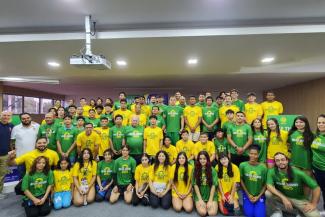PRETORIA, South Africa (January 6) -- A week full of initiatives dedicated to the regional development of wrestling took place in Pretoria from 29th to 08th December, bringing together young athletes, coaches, referees, and administrators from six countries in the region. This landmark event, organized under the REDT program launched by United World Wrestling, provided an exceptional platform for training, education, and competition opportunities for various members of the wrestling community - from athletes to coaches, officials and administrators.
With eight countries involved, this event was a full week of education as follows:
- 29th Nov – 1st Dec - Youth Training Camp 13-15-year-olds, Talent identification with Vincent Aka and Guillermo Menendez Molina.
- 2nd-5th Dec-Senior international training Camp - U16 years olds till seniors, Vincent Aka and Guillermo Menendes Molina.
- 1st- 3rd Dec - UWW Level 2 Referee course with Zach Errett, UWW education Manager.
- 6th-8th Dec - UWW Level 2 Referee course included beach wrestling with Charles Villet, UWW Educator.
- 1st-5th Dec - UWW Level 3 Coaching course with Vincent Aka, UWW Development Officer.
- 6th Dec - Administrators course with Deqa Niamkey, UWW Development Director.
- 7th December - Tournament: U17, U20 and Seniors - FS GR WW
- 8th December - Tournament : Beach Wrestling Men, Women - U17, U20 and Seniors
A National Camp for Youth: A Stepping Stone Toward Dakar 2026

(Vincent Aka and Guillermo Menendes Molina address the Youth Wrestlers at training camp)

(Certificates on conclusion of the Youth Camp)

(Certificates on conclusion of the U16+ - Senior camp)
The week began with a national camp exclusively for young talents. The participants, primarily from South Africa, underwent intensive training sessions and enriching exchanges under the supervision of United World Wrestling experts. The goal was to identify and select promising young athletes, with a primary focus on preparing the best youth wrestlers to shine at the Dakar 2026 Youth Olympic Games.
An International Training Camp and Courses for Coaches, referees and administrators
Following this youth talent identification camp, an international training camp allowed wrestlers, from cadets to seniors, to refine their techniques. To support skill development at all levels, several specialized courses were organized:
- Level 3 Coaching Course, led by Vincent AKA, offering advanced tools for better understanding training periodization and building one's coaching philosophy.

(Coaches and referees)
In this regard, coach Markus Dekker, head coach of the South African Wrestling Federation, underline: << this program was excellence, I got a lot of positive feedback from the participants>>.
- Level 2 Refereeing Course, delivered by Zach Errett and Charles Villet, aimed at ensuring high-quality officiating during competitions. Initially led by Zach Errett, the course was later implemented by Charles Villet in real competition settings during the Olympic Wrestling and Beach Wrestling events at the end of the week.

(Coaches join the referees in a technical rules course)
About the refereeing course, OKOU Timipre, a participant from Nigeria, said: <<The Programme was quite inspiring and apt. However, it will improve the technical and managerial abilities and skills of the Athletes, Coaches, Referees and Administrators in the African Continent and the World at large>>
- Sports Administration Course, conducted in person by Déqa Niamkey and complemented by a virtual session led by Youssef Bouaziz for national federation and club administrators. Youssef was impressive and demonstrate a high expertise in ARENA by taking control of participants computers and support and guiding them to better understand and act according to difficult situations.

(Ms. Deqa Niamkey addresses the coaches)

(Ms. Deqa Niamkey with the RSA Tournament Administration team)
Competitions and Beach Wrestling to Wrap Up the Week
The week concluded with a grand finale featuring an Olympic wrestling tournament that showcased the talent and determination of the participants. A dedicated Beach Wrestling Day, a growing and spectacular discipline, brought the event to a close with a friendly and sporty atmosphere.

(Wrestlers from different countries pose together for a group photo after the competition)

(Senior women at the beach wrestling competition)

(Namibia VS Zambia, women's beach wrestling)
 (Rules discussion at the Beach Wrestling Competition)
(Rules discussion at the Beach Wrestling Competition)
A Promising Regional Event
This gathering brought together participants from eight countries: South Africa, Botswana, Zimbabwe, Namibia, Nigeria (represented by a referee and a coach), Zimbabwe, Ecuador and Zambia. This diverse representation highlights the regional commitment to developing wrestling and fostering cooperation among African nations.
Merci Mulenga, President of the Zambian Wrestling Federation, appreciated the REDT and said: “From the Zambian team we would like to send our greatest gratitude to United World Wrestling for giving us the privilege to attend the Intunthuko regional camp and tournament. It is the first time we are attending such an event. I would like to express my appreciation for the good coaching session. It was very helpful and educational to not only us, who are still in the learning phase. but to others as well. On a scale of 10, I would rate my experience at 10/10 and look forward to more amazing programs of the same kind."
For her part, Jeanne-Marié Coetzer, Secretary General of the South African Wrestling Federation insists on the chance brought by the REDT: "This event provided an opportunity for neighboring countries to form a hub that allows their athletes, coaches and referees to gain international exposure and training which would otherwise be very difficult due to finances required for travel to obtain these qualifications otherwise."
The presence of Déqa Niamkey, Director of Development at United World Wrestling, inspired all the participants at this REDT event. By creating training opportunities and strengthening connections among wrestling stakeholders, the REDT laid a solid foundation for the future of the sport in Southern Africa. Participants returned home enriched and ready to share the knowledge gained, making this initiative a model for sports development across the continent.














Share your thoughts.
Comments